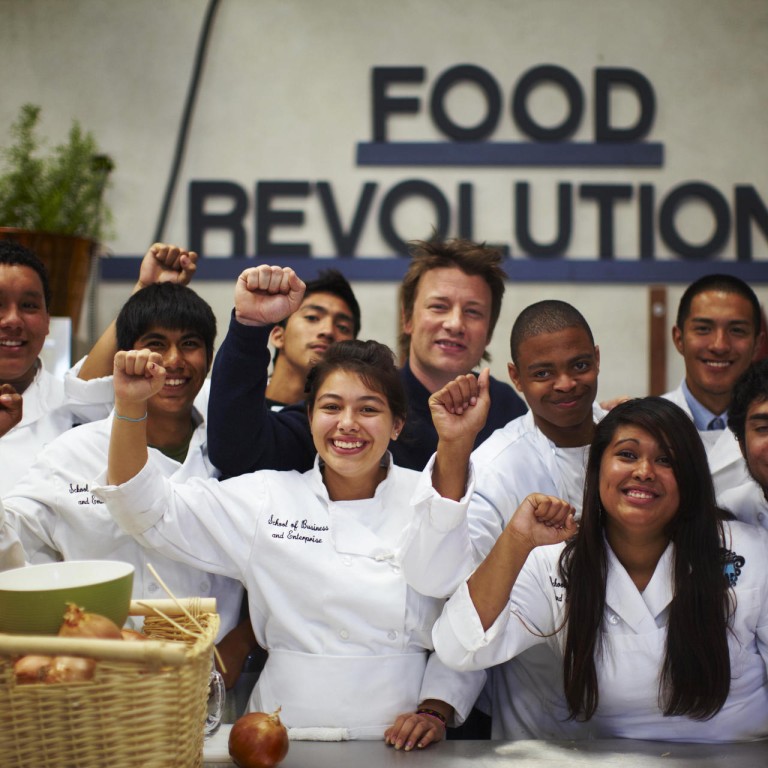
Healthy gourmet: Jamie Oliver's Food Revolution
As Jamie Oliver's global Food Revolution hits Hong Kong, chef Andrea Oschetti explains how being kind to your waistline can bring pleasure to your palate
I am a chef and I am in love with food: it has the power to make us healthy and happy. But it also has potential to make us fat.
An obesity epidemic is under way. Worldwide, obesity has nearly doubled since 1980, according to the World Health Organisation. In Hong Kong, 37 per cent of those aged 18 to 64 are overweight or obese (a body mass index of 23 or greater), based on the Centre for Health Protection's Behavioural Risk Factor Survey published in April last year.

Frustrated with the obesity epidemic, British celebrity chef Jamie Oliver last year launched a global day of action to boost education and awareness of eating better as a society. This year, Oliver's Food Revolution Day - which falls on Friday - has spread to 75 countries from 56 last year.
Hong Kong is involved once again, hosting cooking classes, herb growing workshops, dinner gatherings, exhibitions, special set menus from eateries, and even a leftover vegetable collection at a wet market planned during the coming weeks. Among those involved include the HK Catholic Vegetarian Association, Polytechnic University's Food & Wine Academy, Island East Markets, Health Concept organic store, and eateries such as IPC Foodlab, Mana, Habitu, Harakan-S and Grassroots Pantry.
This Friday at Cheung Chau's Piu Sik Float Parade, a mini Jamie Oliver - the first time a non-Chinese child will play a role in the traditional bun festival parade - and a little farmer will meet more than 30,000 participants to spread the message of responsible healthy eating.
it's all about giving people the knowledge and confidence to cook from fresh ingredients
"Anyone can support Food Revolution Day, even with something as simple as holding a dinner party with fresh cooked ingredients or just trying a new type of fresh food," says Beatrice Chan, Hong Kong ambassador for the Food Revolution. "Everyone is welcome to help or join in. It's a very friendly, welcoming day."
More than 550 local ambassadors, such as Chan, have planned events all over the world. These ambassadors, many of them local chefs, bloggers, teachers, nutritionists or simply parents wanting to get involved in improving food for their children, have organised street markets, school cooking classes, workshops, foodie tours and dinners - anything to get the message across about better food.
In London on Friday, Oliver will be hosting a day of food, fun and surprises at a street party outside his restaurant, Fifteen, in Shoreditch. There will also be a live Google+ hangout on the day, where Oliver will be connecting with the global community.
"Food Revolution Day is all about people power. I was amazed last year when we managed to get over 1,000 events organised across the globe in only a few weeks; but this year, the response has truly been incredible. Food Revolution has reached 75 countries, which shows that the demand for better food education is a global phenomenon," says Oliver.
"For me, Food Revolution Day is all about building better relationships with great food - whether that's through hosting a big event, like a farmers' market, or a small dinner with freshly prepared food, it's all about giving people the knowledge and confidence to make better choices about what they feed themselves and their families."
The path to health starts with being conscious of what we put in our bodies. You are what you eat, physically and emotionally. But the common view is that healthy, nutritious food is not tasty or enjoyable. But as a chef I know that nourishing food can also be pleasurable.
Consciousness must be supported by habits. It starts at home: all that is needed to whip up a great meal is the love for good food and the willingness to source the best ingredients.
When dining out, be demanding: fats and sugars are used in abundance to cover poor quality ingredients. Cooking methods also change nutritional values. Raw olive oil is very healthy, but at high temperatures it becomes trans fat, a "bad" fat for the body. Fish swimming in butter is not healthy any more, and its delicate taste is gone.
Chan wants the campaign to stimulate discussions on food topics, including healthy diet, treasuring food resources and the risks of processed food. She is an ardent supporter of local farming.
"In Hong Kong, food revolutionaries and local diehard farmers have been fighting alone for the past decade," she says. "However, with the prevalence of consuming local and organic food spreading across the globe, the increased demand has led to the revival of local farming and farmers' markets. We can now purchase in-season local vegetables and at the same time support our local farmers.
"The success of the local farmers' markets shows that Hongkongers are concerned about their health. There is a huge demand for toxic-free food. Additionally, there is also some large-scale investment taking place in Hong Kong, such as a commercially run hydroponic vegetable farm, which started last year."
Chan points to another revolution emerging inside the city centre: rooftop farming. Commercial rooftop sites, such as HK Farm, have opened for the public to rent their own box to plant and grow their own food.
"Local families are beginning to utilise their balconies, rooftops and even windowsills to start growing their own herbs and vegetables," she says.
Go to frd.asia for a list of Food Revolution events in Hong Kong
